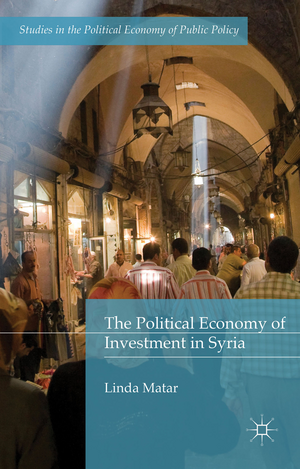The Political Economy of Investment in Syria: Studies in the Political Economy of Public Policy
Autor Linda Mataren Limba Engleză Paperback – 28 mai 2020
| Toate formatele și edițiile | Preț | Express |
|---|---|---|
| Paperback (1) | 380.45 lei 6-8 săpt. | |
| Palgrave Macmillan UK – 28 mai 2020 | 380.45 lei 6-8 săpt. | |
| Hardback (1) | 386.61 lei 6-8 săpt. | |
| Palgrave Macmillan UK – 6 ian 2016 | 386.61 lei 6-8 săpt. |
Din seria Studies in the Political Economy of Public Policy
-
 Preț: 255.97 lei
Preț: 255.97 lei -
 Preț: 219.95 lei
Preț: 219.95 lei -
 Preț: 385.84 lei
Preț: 385.84 lei - 15%
 Preț: 639.25 lei
Preț: 639.25 lei - 15%
 Preț: 698.80 lei
Preț: 698.80 lei - 15%
 Preț: 646.94 lei
Preț: 646.94 lei -
 Preț: 394.87 lei
Preț: 394.87 lei -
 Preț: 387.75 lei
Preț: 387.75 lei - 15%
 Preț: 701.25 lei
Preț: 701.25 lei - 18%
 Preț: 1009.08 lei
Preț: 1009.08 lei - 18%
 Preț: 1114.21 lei
Preț: 1114.21 lei - 15%
 Preț: 700.94 lei
Preț: 700.94 lei - 18%
 Preț: 889.26 lei
Preț: 889.26 lei - 15%
 Preț: 583.13 lei
Preț: 583.13 lei - 15%
 Preț: 508.75 lei
Preț: 508.75 lei - 15%
 Preț: 497.64 lei
Preț: 497.64 lei - 15%
 Preț: 638.24 lei
Preț: 638.24 lei - 18%
 Preț: 721.19 lei
Preț: 721.19 lei - 18%
 Preț: 783.68 lei
Preț: 783.68 lei - 18%
 Preț: 731.10 lei
Preț: 731.10 lei
Preț: 380.45 lei
Nou
Puncte Express: 571
Preț estimativ în valută:
72.81€ • 75.81$ • 61.53£
72.81€ • 75.81$ • 61.53£
Carte tipărită la comandă
Livrare economică 10-24 martie
Preluare comenzi: 021 569.72.76
Specificații
ISBN-13: 9781349577323
ISBN-10: 1349577324
Pagini: 184
Ilustrații: XIV, 184 p.
Dimensiuni: 140 x 216 mm
Greutate: 0.24 kg
Ediția:1st ed. 2016
Editura: Palgrave Macmillan UK
Colecția Palgrave Macmillan
Seria Studies in the Political Economy of Public Policy
Locul publicării:London, United Kingdom
ISBN-10: 1349577324
Pagini: 184
Ilustrații: XIV, 184 p.
Dimensiuni: 140 x 216 mm
Greutate: 0.24 kg
Ediția:1st ed. 2016
Editura: Palgrave Macmillan UK
Colecția Palgrave Macmillan
Seria Studies in the Political Economy of Public Policy
Locul publicării:London, United Kingdom
Cuprins
1. Introduction
2. Review of the Theoretical Framework on Investment Decisions
3. Investment Promotion in Developing Countries
4. Class and State Capitalism in Syria
5. Investment Liberalisation during the Hafiz Assad Regime: Moving to a 'Freer' Market
6. Economic Liberalisation as an Irreversible Trend during the Bashar Regime: The Socioeconomic Fuel of the Syrian Crisis
7. Conclusion: Difficult Exit from a Prolonged Conflict
2. Review of the Theoretical Framework on Investment Decisions
3. Investment Promotion in Developing Countries
4. Class and State Capitalism in Syria
5. Investment Liberalisation during the Hafiz Assad Regime: Moving to a 'Freer' Market
6. Economic Liberalisation as an Irreversible Trend during the Bashar Regime: The Socioeconomic Fuel of the Syrian Crisis
7. Conclusion: Difficult Exit from a Prolonged Conflict
Notă biografică
Linda Matar is Research Fellow at The National University of Singapore. Her research involves the political economy of the Arab Near East with particular emphasis on Syria. Her recent publications include the article 'Twilight of 'state capitalism' in formerly 'socialist' Arab states' (The Journal of North African Studies, 2013).
Textul de pe ultima copertă
Linda Matar examines Syria's failure to promote employment-generating investment prior to the uprising. Tackling the thorny issue of the inapplicability of modern investment theory to a developing country, she situates the analysis of investment in Syria in its historical context and examines the socioeconomic structure and political preconditions that set the course of capital accumulation. Matar argues that the class in charge of development, which oversaw the allocation of resources during the Hafiz and Bashar Assad regimes, precipitated a crisis of capital accumulation. Difficult-to-access data and information compiled from fieldwork reveal how neoliberal reforms failed to build productive capacity and instead enriched a few through short-term speculative and mercantile ventures. Productive investment in Syria prior to the uprising lurched downward, and the key related socio-economic variables followed. These deteriorating conditions contributed to the social explosion in 2011.Exploring the poor quality and quantity of investment, this study probes how the cant of the free market served as a veneer behind which the institutional decisions distorted income distribution in a way that would inevitably lead to collapse.



















